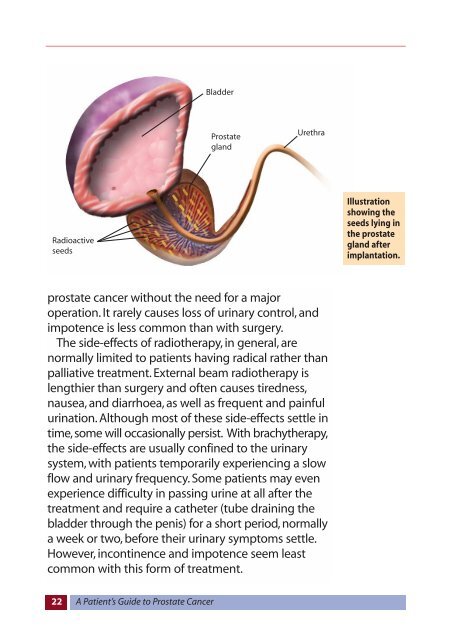A Patient's Guide to Prostate Cancer - Prostate Cancer Centre
A Patient's Guide to Prostate Cancer - Prostate Cancer Centre
A Patient's Guide to Prostate Cancer - Prostate Cancer Centre
You also want an ePaper? Increase the reach of your titles
YUMPU automatically turns print PDFs into web optimized ePapers that Google loves.
Radioactive<br />
seeds<br />
prostate cancer without the need for a major<br />
operation. It rarely causes loss of urinary control, and<br />
impotence is less common than with surgery.<br />
The side-effects of radiotherapy, in general, are<br />
normally limited <strong>to</strong> patients having radical rather than<br />
palliative treatment. External beam radiotherapy is<br />
lengthier than surgery and often causes tiredness,<br />
nausea, and diarrhoea, as well as frequent and painful<br />
urination. Although most of these side-effects settle in<br />
time, some will occasionally persist. With brachytherapy,<br />
the side-effects are usually confined <strong>to</strong> the urinary<br />
system, with patients temporarily experiencing a slow<br />
flow and urinary frequency. Some patients may even<br />
experience difficulty in passing urine at all after the<br />
treatment and require a catheter (tube draining the<br />
bladder through the penis) for a short period, normally<br />
a week or two, before their urinary symp<strong>to</strong>ms settle.<br />
However, incontinence and impotence seem least<br />
common with this form of treatment.<br />
22<br />
A Patient’s <strong>Guide</strong> <strong>to</strong> <strong>Prostate</strong> <strong>Cancer</strong><br />
Bladder<br />
<strong>Prostate</strong><br />
gland<br />
Urethra<br />
Illustration<br />
showing the<br />
seeds lying in<br />
the prostate<br />
gland after<br />
implantation.


